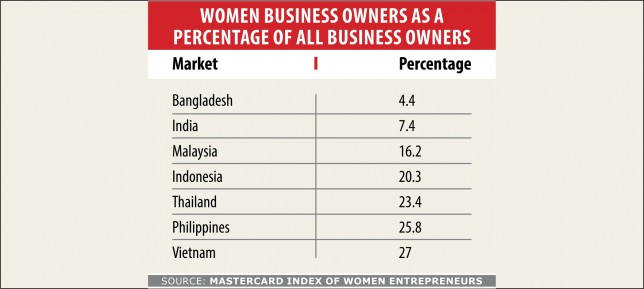Bangladesh far behind peers

Bangladesh ranked 57th out of 58 economies in the world in the Mastercard Index of Women Entrepreneurs (MIWE 2019), highlighting the country’s poor record in creating enabling environment for female-headed businesses.
The country’s ranking is unchanged from last year’s and is only ahead of Egypt in this year’s standing, according to a new report from the global technology company in the global payments industry.
The report was released on November 20.
The country emerged at the bottom of the ranks because of poor progress in women’s advancement as business leaders and professionals, lack of access to financial service and products, and lower quality of governance.
However, women business ownership as a percentage of all business owners rose from 4.2 percent to 4.4 percent this year. The score improved to 35.9 points from 35.2 points out of 100.
Based on publicly available data from international organisations, including the International Labour Organisation, the Unesco and the Global Entrepreneurship Monitor, the index tracks the progress and achievement of women entrepreneurs and business owners in 58 economies, which represent nearly 80 percent of the world’s female labour force.
They are ranked across three components: women’s advancement outcomes; knowledge assets and financial access; and supporting entrepreneurial factors.
In Asia, Bangladesh is behind India (ranked 52nd), Indonesia (ranked 23rd), Malaysia (ranked 21st), Vietnam (ranked 19th), Thailand (ranked 14th), and the Philippines (ranked 11th).
Women in the United States topped the charts for the first time, fuelled by highly supportive entrepreneurial conditions. New Zealand trailed closely in second spot.
The MIWE 2019, now in its third edition, reaffirmed the trend that female business owners or entrepreneurs appear to flourish in high-income and advanced economies such as the US, New Zealand, Canada, Australia, Ireland, Switzerland and Singapore where the component scores for women’s advancement, women’s knowledge assets and financial access, and underlying entrepreneurial conditions are higher.
In these open and vibrant markets where the support for SMEs and ease of doing business are high, women tend to make further inroads in the business world and are able to establish a more prominent and empowered standing in society as business leaders and owners and active contributors to the economy (high labour force participation rates).
In contrast, markets that scored and ranked lower tend to be less wealthy and developed and are concentrated in the Middle East and North African region. In these markets such as Uganda, Malawi, Egypt, Saudi Arabia, Ethiopia, Iran, Algeria and the UAE, the conditions for women to advance as entrepreneurs and business leaders and professionals are considerably less enabling.
The factors include: restraining social barriers that make women entrepreneurs less accepted/regarded in society; restrictive financial barriers that prevent women from obtaining funding for business startups due to lack of collateral; and biased economic systems whereby women are sidelined in the workplace.
“What is clear through this research is that gender inequality continues to persist across the world, although it manifests in different ways,” Julienne Loh, executive vice president for enterprise partnerships at Asia Pacific of Mastercard, said in the statement.
It is not a developed or developing world problem alone. Even in markets with the most promising entrepreneurial conditions, women’s business ownership hasn’t reached its full potential.
“This marginalisation hinders the empowerment of women socially, professionally, economically and politically – to the detriment of society as a whole. That’s why Mastercard is tackling this problem head on, all over the world, by providing the tools and networks that drive inclusive growth and put the digital economy to work for everyone, everywhere,” Loh said.
Ann Cairns, executive vice chairman of Mastercard, said women-owned and led businesses are strong catalysts for economic growth, improving the lives of everyone.
“With this study, we are shining a light on those under-represented because even today, inequality and exclusion still hold women back.”
“Now is the time for governments and organisations to power together to support women to advance their businesses by eradicating gender-bias and ensuring greater access to education and financial inclusion,” Cairns said.
